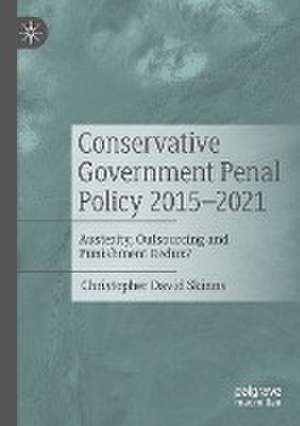Conservative Government Penal Policy 2015-2021: Austerity, Outsourcing and Punishment Redux?
Autor Christopher David Skinnsen Limba Engleză Paperback – 29 iul 2023
This investigation has meant touching on topical debates dealing with the impact of resource scarcity on offenders' experiences of the penal system, the impact of an increasing emphasis on punishment on offenders’ sense of justice and fairness, the balance struck between infection control and offender welfare during the government handling of the SARS-CoV-2 pandemic and why successive Conservative governments have intransigently pursued a penal policy that has proved crisis-exacerbating.
The overall conclusion reached is that penal policy is too important to be left to governments alone and needs to be recalibrated by a one-off inquiry, complemented by an on-going advisory body capable of requiring governments to ‘explain or change’. The book is distinctive in that it provides a critical review of penal policy change, whist combining this with insights derived from the sociological analysis of penal trends.
| Toate formatele și edițiile | Preț | Express |
|---|---|---|
| Paperback (1) | 533.20 lei 6-8 săpt. | |
| Springer International Publishing – 29 iul 2023 | 533.20 lei 6-8 săpt. | |
| Hardback (1) | 538.76 lei 6-8 săpt. | |
| Springer International Publishing – 29 iul 2022 | 538.76 lei 6-8 săpt. |
Preț: 533.20 lei
Preț vechi: 627.29 lei
-15% Nou
Puncte Express: 800
Preț estimativ în valută:
102.06€ • 110.90$ • 85.79£
102.06€ • 110.90$ • 85.79£
Carte tipărită la comandă
Livrare economică 21 aprilie-05 mai
Preluare comenzi: 021 569.72.76
Specificații
ISBN-13: 9783031007996
ISBN-10: 3031007999
Ilustrații: XIII, 471 p.
Dimensiuni: 148 x 210 mm
Greutate: 0.58 kg
Ediția:1st ed. 2022
Editura: Springer International Publishing
Colecția Palgrave Macmillan
Locul publicării:Cham, Switzerland
ISBN-10: 3031007999
Ilustrații: XIII, 471 p.
Dimensiuni: 148 x 210 mm
Greutate: 0.58 kg
Ediția:1st ed. 2022
Editura: Springer International Publishing
Colecția Palgrave Macmillan
Locul publicării:Cham, Switzerland
Cuprins
1. Introduction.- 2. Critique.- 3. Courts and sentencing.- 4. Prisons.- 5. Probation.- 6. Bias and discrimination in the penal system.- 7. The pandemic and the penal system.- 8. Why has the penal crisis been exacerbated by recent government policy?.- 9. What is to be done?.- 10. Conclusion.
Notă biografică
Christopher David Skinns is an independent commentator. He has a long-standing interest in penal policy, first stimulated by his work with young offenders immediately after graduating. After completing postgraduate degrees at Sheffield University, UK, and Cambridge University, UK, he went on to further develop this interest by teaching criminology in higher education. He completed a PhD at Hull University, UK. After retiring from university teaching, he began work with the Independent Monitoring Board for Prisons.
Textul de pe ultima copertă
This book interrogates Conservative government penal policy for adult and young adult offenders in England and Wales between 2015 and 2021. Government penal policy is shown to have been often ineffective and costly, and to have revived efforts to push the system towards a disastrous combination of austerity, outsourcing and punishment that has exacerbated the penal crisis.
This investigation has meant touching on topical debates dealing with the impact of resource scarcity on offenders' experiences of the penal system, the impact of an increasing emphasis on punishment on offenders’ sense of justice and fairness, the balance struck between infection control and offender welfare during the government handling of the SARS-CoV-2 pandemic and why successive Conservative governments have intransigently pursued a penal policy that has proved crisis-exacerbating.
The overall conclusion reached is that penal policy is too important to be left to governments alone and needs to be recalibrated by a one-off inquiry, complemented by an on-going advisory body capable of requiring governments to ‘explain or change’. The book is distinctive in that it provides a critical review of penal policy change, whist combining this with insights derived from the sociological analysis of penal trends.
Christopher David Skinns is an independent commentator. He has a long-standing interest in penal policy, first stimulated by his work with young offenders immediately after graduating. After completing postgraduate degrees at Sheffield University, UK, and Cambridge University, UK, he went on to further develop this interest by teaching criminology in higher education. He completed a PhD at Hull University, UK. After retiring from university teaching, he began work with the Independent Monitoring Board for Prisons.
This investigation has meant touching on topical debates dealing with the impact of resource scarcity on offenders' experiences of the penal system, the impact of an increasing emphasis on punishment on offenders’ sense of justice and fairness, the balance struck between infection control and offender welfare during the government handling of the SARS-CoV-2 pandemic and why successive Conservative governments have intransigently pursued a penal policy that has proved crisis-exacerbating.
The overall conclusion reached is that penal policy is too important to be left to governments alone and needs to be recalibrated by a one-off inquiry, complemented by an on-going advisory body capable of requiring governments to ‘explain or change’. The book is distinctive in that it provides a critical review of penal policy change, whist combining this with insights derived from the sociological analysis of penal trends.
Christopher David Skinns is an independent commentator. He has a long-standing interest in penal policy, first stimulated by his work with young offenders immediately after graduating. After completing postgraduate degrees at Sheffield University, UK, and Cambridge University, UK, he went on to further develop this interest by teaching criminology in higher education. He completed a PhD at Hull University, UK. After retiring from university teaching, he began work with the Independent Monitoring Board for Prisons.
Caracteristici
Examines short and long term trends in penal policy including the continued preference for punitive managerialism Provides a clear and detailed account of penal policy changes Builds on from his previous book: Coalition Government Penal Policy 2010–2015
